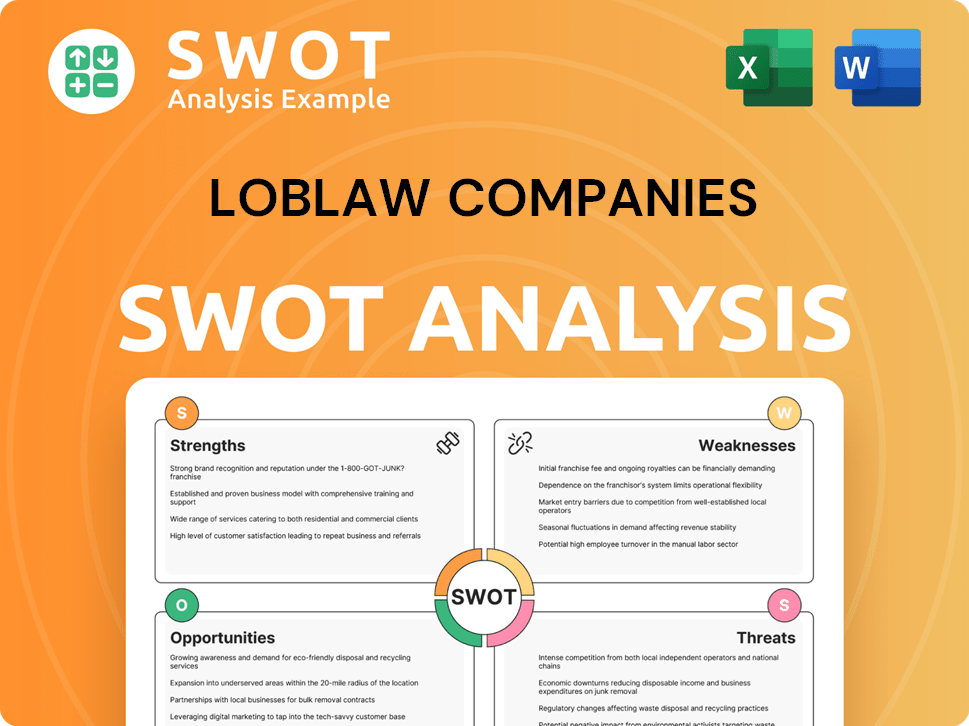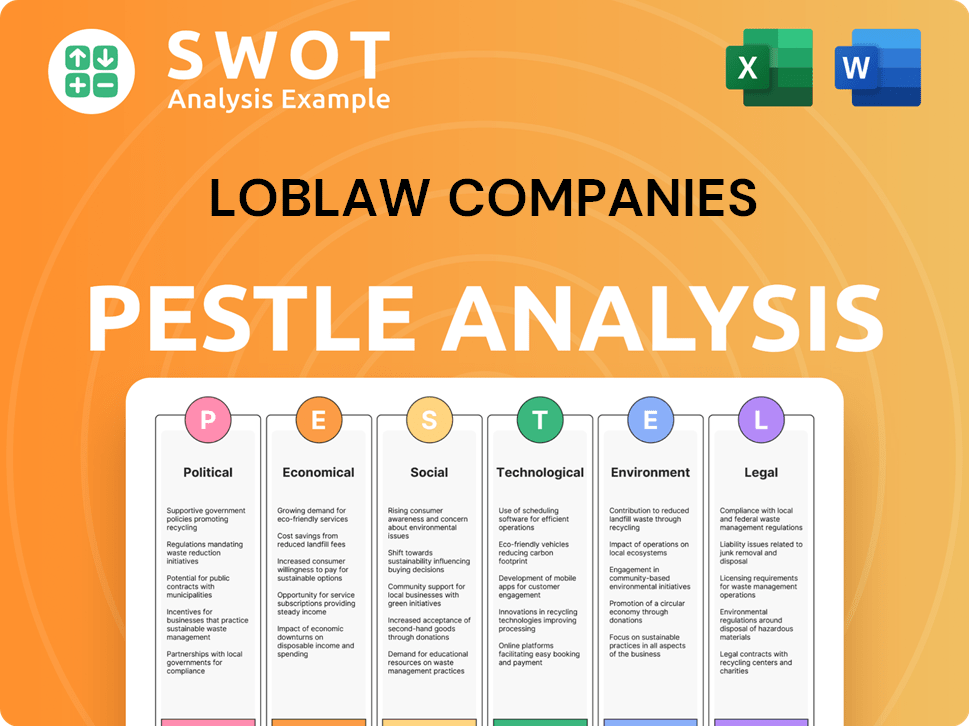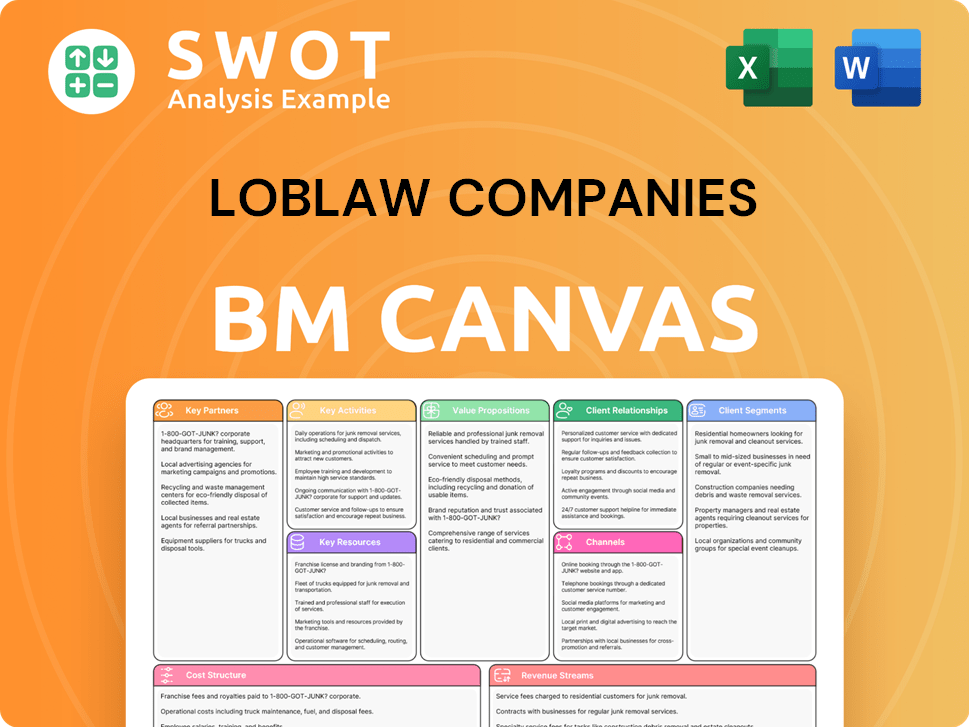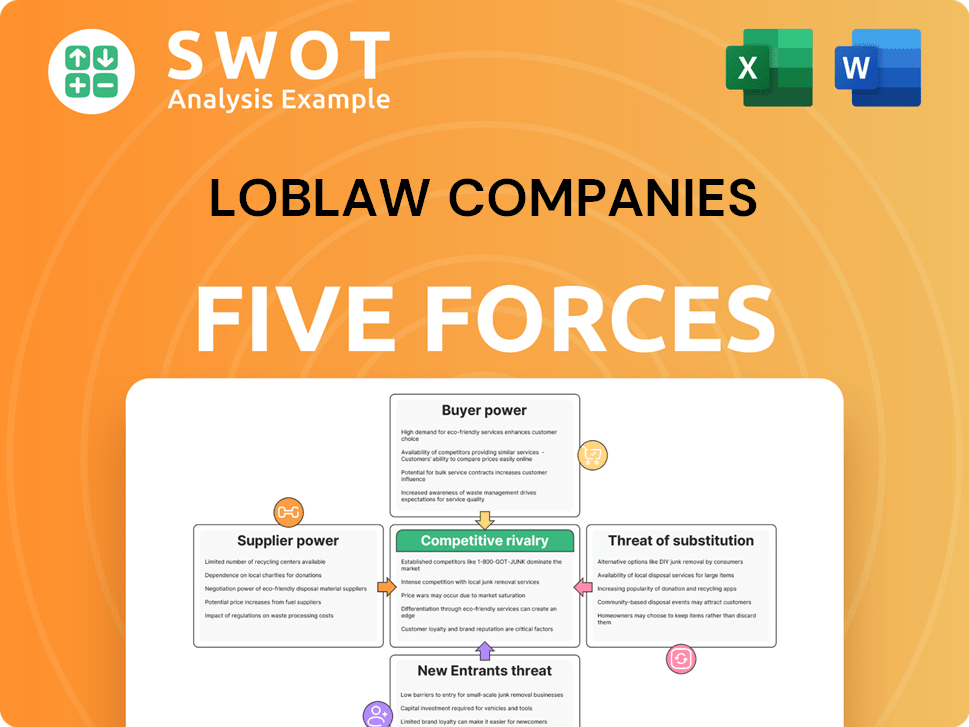Loblaw Companies Bundle
Who Really Owns Loblaw Companies?
Delving into the ownership of Loblaw Companies is key to understanding its strategic moves and market dominance. Did you know that a pivotal acquisition in 1947 fundamentally shaped Loblaw's journey? This exploration unveils the intricate web of stakeholders influencing one of Canada's retail giants.

Founded in 1919 in Toronto, Loblaw, initially known as Loblaw Groceterias, revolutionized grocery shopping. Today, as Canada's largest food retailer, Loblaw Companies SWOT Analysis reveals the impact of its diverse portfolio, from grocery and pharmacy to financial services. With a significant presence in the Canadian retail landscape, understanding the influence of key players like George Weston Limited and the legacy of founders Theodore Pringle Loblaw and J. Milton Cork is crucial. The question of "Who owns Loblaw" is more complex than it seems, involving public shareholders and the enduring impact of Galen Weston.
Who Founded Loblaw Companies?
The history of Loblaw Companies Limited begins in 1919, with its founding by Theodore Pringle Loblaw and J. Milton Cork in Toronto, Ontario. Their vision introduced the 'groceteria' concept, which revolutionized the grocery business with self-service and cash-and-carry shopping. This innovative approach contrasted sharply with the traditional, labor-intensive grocery models of the time.
Theodore Loblaw, a visionary entrepreneur, and J. Milton Cork, a successful businessman, formed a partnership that was instrumental in the company's early success. While specific details on the initial equity split aren't readily available, their combined efforts laid the foundation for what would become a leading food retailer in Canada. Understanding the early ownership structure provides context to Loblaw's evolution and the influence of key figures.
Early in its history, Loblaw Groceterias established itself as a prominent player in the Canadian food retail sector. In 1947, a significant shift occurred when W. Garfield Weston, the president of George Weston Limited, acquired 100,000 Class B shares from J. Milton Cork. This move marked the beginning of a new era, with Weston's influence growing over time. This acquisition was a pivotal moment in the evolution of Loblaw Companies.
The early ownership of Loblaw Companies saw significant changes, particularly with the involvement of W. Garfield Weston and George Weston Limited. The acquisition of shares by Weston in 1947 was a crucial step in shaping the company's future. Understanding the early ownership structure provides context to Loblaw's evolution and the influence of key figures.
- Early Founders: Theodore Pringle Loblaw and J. Milton Cork founded Loblaw Companies Limited.
- Weston's Entry: W. Garfield Weston, through George Weston Limited, acquired shares in 1947.
- Growing Influence: Weston's acquisition allowed him to appoint key personnel, increasing his influence.
- Early Agreements: Details on early agreements like vesting schedules or buy-sell clauses are not available in the provided information.
Loblaw Companies SWOT Analysis
- Complete SWOT Breakdown
- Fully Customizable
- Editable in Excel & Word
- Professional Formatting
- Investor-Ready Format

How Has Loblaw Companies’s Ownership Changed Over Time?
The ownership of Loblaw Companies has evolved significantly since its inception. A crucial shift occurred in 1947 when W. Garfield Weston, representing George Weston Limited, acquired a considerable stake in the company. By 1953, Weston had secured majority control, integrating Loblaw into the George Weston Limited group. This strategic move laid the groundwork for the formal incorporation of Loblaw Companies Limited in 1956, which was designed to manage Weston's grocery operations.
Today, Loblaw's growth strategy and overall direction are heavily influenced by its ownership structure. George Weston Limited, a Canadian holding company, maintains control over Loblaw Companies Limited. The Weston family, through Wittington Investments, Ltd. Canada, holds a majority ownership in George Weston Limited, thereby exerting significant influence over Loblaw. Galen G. Weston, as the Chair of both Loblaw and George Weston Limited, reinforces this familial control.
| Key Event | Year | Impact on Ownership |
|---|---|---|
| W. Garfield Weston acquires stake | 1947 | Initiated Weston family's influence |
| Weston gains majority control | 1953 | Consolidated Weston's dominance |
| Loblaw Companies Limited incorporated | 1956 | Formalized structure for grocery operations |
Loblaw Companies Limited is publicly traded on the Toronto Stock Exchange (TSX: L). As of April 22, 2025, there were 299,001,231 common shares outstanding. Major institutional investors also hold substantial stakes, including AllianceBernstein Investments Taiwan Ltd., Manulife Investment Management Ltd., RBC Indigo Asset Management Inc., Quadravest Capital Management, Inc., and I. G. Investment Management Ltd. The company's revenue in 2024 was CA$61.01 billion, reflecting a 2.49% increase from the previous year. These ownership dynamics, particularly the strong control by George Weston Limited, have been instrumental in shaping Loblaw's strategic decisions, including its expansion through acquisitions in the 1950s and 1960s, and its focus on private label brands like President's Choice and No Name.
The Weston family, through George Weston Limited, maintains significant control over Loblaw Companies.
- Galen Weston's role as Chair of both Loblaw and George Weston Limited solidifies the family's influence.
- Major institutional investors hold significant stakes in the publicly traded company.
- The company's financial performance in 2024 showed revenue of CA$61.01 billion.
- The ownership structure has shaped Loblaw's strategic direction, including its brand development.
Loblaw Companies PESTLE Analysis
- Covers All 6 PESTLE Categories
- No Research Needed – Save Hours of Work
- Built by Experts, Trusted by Consultants
- Instant Download, Ready to Use
- 100% Editable, Fully Customizable

Who Sits on Loblaw Companies’s Board?
The current board of directors of Loblaw Companies Limited is pivotal in guiding the company's operations, with representation from significant shareholders and independent members. Galen G. Weston serves as the Chairman of the board, also holding the position of Chairman and CEO of George Weston Limited, the parent company. This dual role highlights the Weston family's substantial influence over Loblaw's strategic direction and governance. The board is elected annually by the shareholders, ensuring a degree of accountability.
The board's composition reflects a balance between the interests of major shareholders and the need for independent oversight. The election process adheres to a majority voting policy, where directors in uncontested elections who receive more 'votes withheld' than 'votes in favour' are expected to tender their resignation. The Governance, Employee Development, Nominating and Compensation Committee then reviews the resignation, with the ability to reject it only in exceptional circumstances. The Weston family's control, through George Weston Limited, inherently provides considerable voting power, shaping key decisions. For more insights into the company's strategic initiatives, consider reading about the Growth Strategy of Loblaw Companies.
| Director | Position | Affiliation |
|---|---|---|
| Galen G. Weston | Chairman | George Weston Limited |
| Sarah Davis | Independent Director | Various |
| Robert Sawyer | Independent Director | Various |
The board is crucial for Loblaw's governance, with Galen G. Weston as Chairman, also leading George Weston Limited. The board is elected annually by shareholders, and operates under a majority voting policy. The Weston family's influence is significant through their controlling interest.
- Galen G. Weston's dual role underscores the family's influence.
- Majority voting policy governs director elections.
- The Governance Committee reviews director resignations.
- George Weston Limited's control grants substantial voting power.
Loblaw Companies Business Model Canvas
- Complete 9-Block Business Model Canvas
- Effortlessly Communicate Your Business Strategy
- Investor-Ready BMC Format
- 100% Editable and Customizable
- Clear and Structured Layout

What Recent Changes Have Shaped Loblaw Companies’s Ownership Landscape?
In the past few years, Loblaw Companies has demonstrated a commitment to returning capital to shareholders and making strategic investments. This is reflected in ongoing share buyback programs, as well as significant capital expenditures planned for future growth. Specifically, between May 6, 2024, and May 5, 2025, Loblaw was authorized to repurchase up to 15,336,875 common shares, representing approximately 5% of its issued and outstanding shares as of April 22, 2024. By March 22, 2025, the company had already repurchased 2,485,405 common shares for cancellation under its current Normal Course Issuer Bid (NCIB), with an aggregate consideration of $457 million. These actions highlight the company's focus on shareholder value and efficient capital allocation.
Furthermore, Loblaw announced a new NCIB effective May 6, 2025, to May 5, 2026, allowing for the purchase of up to 14,950,061 common shares, which is approximately 5% of the outstanding shares as of April 22, 2025. The company also entered into an automatic share purchase plan (ASPP) with a broker to facilitate these repurchases, including purchases from George Weston Limited to maintain its proportionate ownership interest. These initiatives, combined with a planned investment of $2.2 billion in 2025 and over $10 billion by 2030, underscore Loblaw's strategic direction. These investments are aimed at expanding its store network, modernizing its supply chain, and focusing on hard discount banners.
| Metric | Details | Year |
|---|---|---|
| Share Repurchases | 2,485,405 common shares repurchased for cancellation | 2025 (as of March 22) |
| Aggregate Consideration | $457 million | 2025 (as of March 22) |
| Capital Investment (2025) | $2.2 billion | 2025 |
| Capital Investment (by 2030) | Over $10 billion | 2030 (projected) |
Leadership changes and the influence of George Weston Limited continue to shape Loblaw. Per Bank was appointed President and CEO, joining the company by Q1 2024. Galen G. Weston remains the Chair of the Board and CEO of George Weston Limited, indicating a consistent family influence on the company's strategic direction. The increase in the quarterly dividend by 10% in Q1 2025 further demonstrates the company's commitment to returning value to its shareholders. These strategic decisions highlight the ongoing evolution of Loblaw's ownership and its approach to growth and shareholder returns.
Per Bank is the current President and CEO of Loblaw Companies Limited, having joined the company by Q1 2024.
George Weston Limited is the parent company of Loblaw Companies Limited, maintaining significant influence over its strategic decisions.
The stock symbol for Loblaw Companies Limited is L.TO, as it is listed on the Toronto Stock Exchange.
Yes, Galen G. Weston remains the Chair of the Loblaw Board of Directors, and CEO of George Weston Limited, indicating continued family control.
Loblaw Companies Porter's Five Forces Analysis
- Covers All 5 Competitive Forces in Detail
- Structured for Consultants, Students, and Founders
- 100% Editable in Microsoft Word & Excel
- Instant Digital Download – Use Immediately
- Compatible with Mac & PC – Fully Unlocked

Related Blogs
- What are Mission Vision & Core Values of Loblaw Companies Company?
- What is Competitive Landscape of Loblaw Companies Company?
- What is Growth Strategy and Future Prospects of Loblaw Companies Company?
- How Does Loblaw Companies Company Work?
- What is Sales and Marketing Strategy of Loblaw Companies Company?
- What is Brief History of Loblaw Companies Company?
- What is Customer Demographics and Target Market of Loblaw Companies Company?
Disclaimer
All information, articles, and product details provided on this website are for general informational and educational purposes only. We do not claim any ownership over, nor do we intend to infringe upon, any trademarks, copyrights, logos, brand names, or other intellectual property mentioned or depicted on this site. Such intellectual property remains the property of its respective owners, and any references here are made solely for identification or informational purposes, without implying any affiliation, endorsement, or partnership.
We make no representations or warranties, express or implied, regarding the accuracy, completeness, or suitability of any content or products presented. Nothing on this website should be construed as legal, tax, investment, financial, medical, or other professional advice. In addition, no part of this site—including articles or product references—constitutes a solicitation, recommendation, endorsement, advertisement, or offer to buy or sell any securities, franchises, or other financial instruments, particularly in jurisdictions where such activity would be unlawful.
All content is of a general nature and may not address the specific circumstances of any individual or entity. It is not a substitute for professional advice or services. Any actions you take based on the information provided here are strictly at your own risk. You accept full responsibility for any decisions or outcomes arising from your use of this website and agree to release us from any liability in connection with your use of, or reliance upon, the content or products found herein.